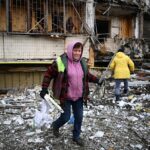
TEL AVIV, Israel (AP) — Nine scholars of history have been awarded the prestigious Dan David Prize for 2022, with each receiving $300,000 to help further their work.
The Dan David Prize board said the nine are being recognized for “breakthrough achievements in the study of the past” in new and creative ways. The winners include a historian who investigates the environmental impact of big business, a researcher who has uncovered Jewish hiding places during the Holocaust and the founder of a mobile museum of African heritage.
“If you are a person who believes history can make a difference in the world, this prize is an affirmation of that,” said Bart Elmore, an environmental historian and one of this year’s winners.
The Dan David Prize board said in its announcement that this year’s recipients are “unlocking the secrets held by human remains and medieval manuscripts, uncovering forgotten legal cases from the American South and revealing echoes of Ethiopian global power.”
The prize, established in 2001, was initially dedicated to recognizing achievements in rotating disciplines of the sciences and the humanities, awarding $1 million prizes in three categories each year, past, present and future. The prize was “redesigned” in 2021 ahead of its 20th anniversary, the board statement said.
The nine 2022 prize recipients are:
— Mirjam Brusius, a cultural historian who studies how objects made their way into major museums and collections, and what happened to them there;
— Elmore, who uses everyday products, “from sodas to seeds,” to demonstrate how large multinational firms have reshaped global ecosystems;
— Tyrone Freeman, a historian of philanthropy who researches African-American charitable giving and activism;
— Verena Krebs, a cultural historian who draws on material culture, art and written sources to uncover the relationship between Ethiopia and Western Christendom;
— Efthymia Nikita, an archaeologist who uses innovative methods to unlock what human skeletal remains reveal about the health, diets and mobility of ancient peoples;
— Nana Oforiatta Ayim, a curator, writer, filmmaker and public historian whose work “re-centers African narratives, institutions and cultural expressions in telling the past;
— Kristina Richardson, a social and cultural historian of the medieval Islamic world who works with understudied manuscripts to focus attention on marginalized groups, among others;
— Natalia Romik, a public historian, architect and curator whose work focuses on Jewish memory and commemoration of the Holocaust in Eastern Europe;
— Kimberly Welch, who uses endangered local legal archives from the antebellum American South to explore lawsuits brought by free and enslaved Black people.
The prize is endowed by the Dan David Foundation and is headquartered at Tel Aviv University.




